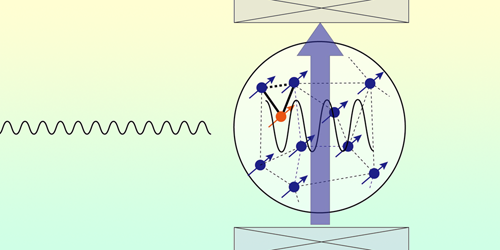Gases Team Up for Enhanced Coherence
Gas magnetometers are some of the most sensitive magnetic-field detectors available. This sensitivity relies on maintaining the spins of atomic nuclei or electrons in a prolonged state of coherence. Xinhua Peng of the University of Science and Technology of China and her colleagues have now extended the spin coherence in one gas by inducing cooperation with spins in another [1]. This coherence extension amplifies measured magnetic signals by at least 3 orders of magnitude.
In a typical gas magnetometer, a probe laser is used to measure the magnetic resonance signal of a spin-polarized gas. This signal is proportional to the local magnetic-field strength, making it a powerful sensing tool. Peng and her team designed a “cooperative” magnetometer in which the polarized gas that’s sampled by the laser (rubidium) is mixed with a second, unpolarized gas (xenon). In this device, the xenon atoms become polarized via collisions with the rubidium atoms. Subsequent collisions involving these now-polarized xenon atoms produce an effective magnetic field, which is detected through the rubidium’s magnetic resonance signal. Using coils that surround the gas cell, the researchers amplify this field, strengthening the alignment of the cooperative xenon spins and extending their coherence time by a factor of 18. This makes the effective magnetic field generated by the xenon atoms significantly larger than the one initially measured through the rubidium resonance signal.
The researchers found that, through this cooperative spin amplification, the magnetometer’s sensitivity to external magnetic fields is increased 2500-fold compared to a device that uses rubidium alone. They say that their work paves the way for cooperative quantum sensors to be used in many systems and that it could allow dark-matter searches with a sensitivity beyond today’s constraints.
–Rachel Berkowitz
Rachel Berkowitz is a Corresponding Editor for Physics Magazine based in Vancouver, Canada.
References
- M. Xu et al., “Cooperative spin amplifier for enhanced quantum sensing,” Phys. Rev. Lett. 133, 133202 (2024).




